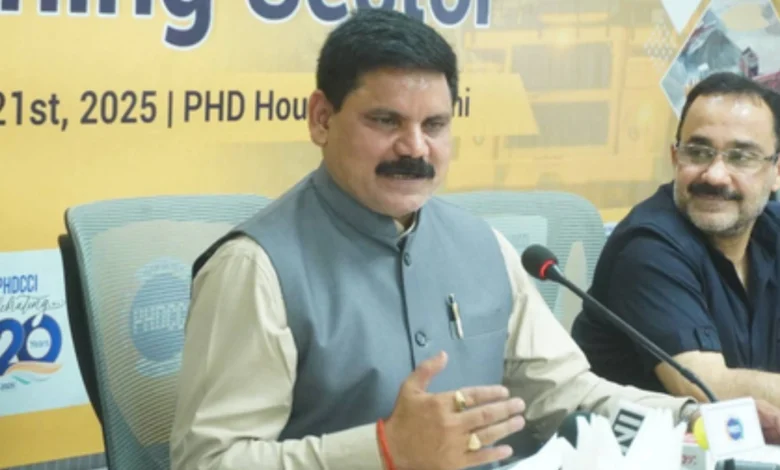Union Minister Urges Industry to Build Skills for Mining Critical Minerals

India is making strong progress in coal production, but there is still a long way to go when it comes to critical minerals. These minerals, essential for producing advanced technologies like electric vehicles, batteries, and renewable energy equipment, are largely imported. To reduce dependency on imports, Union Minister of State for Coal and Mines, Satish Chandra Dubey, urged the country’s industrial leaders to focus on skill development in the mining sector.
Speaking at the PHD Chamber of Commerce and Industry (PHDCCI) conclave on “Creating Future-Ready Manpower for the Mining Sector,” Dubey emphasized that India must build expertise in mining critical minerals. He said, “India has achieved self-reliance in coal production, but we still depend heavily on imports for critical minerals. To address this, the industry must train its workforce and build the necessary skills to mine these resources domestically.”
Importance of Skill Development in the Mining Sector
The minister stressed the need for specialized training and education. He encouraged industrial leaders to set up colleges and universities that focus on mining education. This, he explained, would help equip young people with the skills they need to find jobs in the modern mining industry.
Dubey pointed out that the mining sector is undergoing major changes due to the rise of automation, digital technologies, and sustainable practices. This shift means that mining is becoming less labor-intensive and more dependent on advanced technology. To keep up with these changes, the workforce must be trained in using digital tools, automation systems, and environmentally sustainable methods.
He also praised PHDCCI for its efforts to support the industry and act as its voice in policy discussions. He assured them that the government would continue to support future initiatives aimed at skill development.
The Government’s Vision: Atmanirbhar Bharat and Viksit Bharat 2047
Dubey reminded attendees that Prime Minister Narendra Modi’s vision is to make India self-reliant (Atmanirbhar) in every sector, including mining. The government’s larger goal is to achieve “Viksit Bharat 2047,” or a fully developed India by 2047. Strengthening the mining industry is an essential part of that vision.
Bridging the Skills Gap: Industry-Academia Partnerships
PHDCCI President Hemant Jain also spoke at the event. He highlighted a growing concern: many experienced professionals in the mining sector are nearing retirement. When they leave, they will take decades of valuable knowledge with them. At the same time, it has been challenging to attract young people to the mining industry. Many see other sectors, such as technology and finance, as offering better career prospects.
To address this challenge, Jain proposed three key solutions:
- Transforming Mining Education: Update mining education to make it more relevant to the needs of modern industry.
- Strengthening Industry-Academic Partnerships: Encourage closer collaboration between mining companies and educational institutions to create practical, job-focused training programs.
- Developing an Inclusive Workforce: Ensure that the mining industry provides opportunities for everyone, including women, to participate in the sector’s growth.
Jain emphasized that no single organization can solve the skills gap on its own. It will require a collaborative effort between the government, industry leaders, and academic institutions.
Moving Toward a High-Tech, Sustainable Mining Industry
The mining sector has traditionally been seen as labor-intensive and physically demanding. However, with advances in automation, artificial intelligence (AI), and digital technologies, the industry is becoming more high-tech. This transformation opens up new opportunities for skilled workers who can operate advanced machinery, analyze data, and implement sustainable mining practices.
By investing in skills development and modern education, India’s mining sector can reduce its reliance on imported minerals, create more jobs, and contribute to the country’s long-term economic growth.
Conclusion: A Path Toward Self-Reliance
The mining industry plays a crucial role in India’s economy. By focusing on skill development, industry leaders can help India reduce its dependence on mineral imports and move closer to achieving the goal of Atmanirbhar Bharat. With the right training, advanced technology, and collaborative efforts, India’s mining workforce can be prepared for the challenges and opportunities of the future.
This focus on education, innovation, and inclusivity will not only strengthen the mining sector but also contribute to India’s overall development, helping the country achieve its ambitious goal of becoming a fully developed nation by 2047.